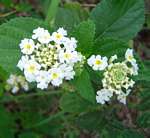Flora of Zimbabwe: Cultivated plants
| Home | > | List of cultivated families | > | Verbenaceae | > | Lantana |
7144.000 Lantana
Description of the genus
Links to cultivated taxa View: living plant images - herbarium specimen images - all images for this genus
| Species | Content |
| camara L. | Description, Image |
| montevidensis (Spreng.) Briq. |
Other sources of information about Lantana:
External websites:
African Plants: A Photo Guide (Senckenberg): LantanaBHL (Biodiversity Heritage Library): Lantana
EOL (Encyclopedia of Life): Lantana
GBIF (Global Biodiversity Information Facility): Lantana
Google: Web - Images - Scholar
iNaturalist: Lantana
IPNI (International Plant Names Index): Lantana
JSTOR Plant Science: Lantana
Mansfeld World Database of Agricultural and Horticultural Crops: Lantana
Plants of the World Online: Lantana
Tropicos: Lantana
Wikipedia: Lantana
| Home | > | List of cultivated families | > | Verbenaceae | > | Lantana |
